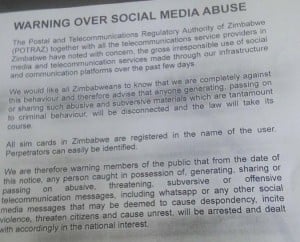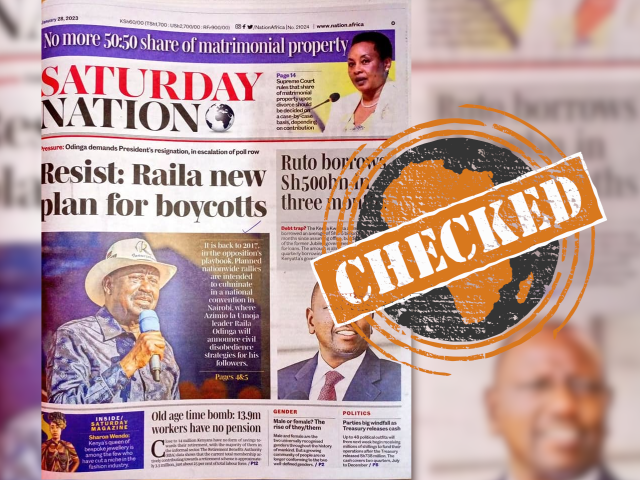Could the Zim government really have shut down WhatsApp? An expert weighs in
| Update: National advocacy coordinator of South African group the Right2Know Campaign, Murray Hunter, confirmed via email that the "Warning over social media abuse" did originate from the Post and Telecommunications Authority of Zimbabwe. |
 Under the protest banner #ShutdownZim2016, Zimbabwe experienced a nationwide strike on Wednesday, reportedly against corruption, import bans and currency shortages.
Under the protest banner #ShutdownZim2016, Zimbabwe experienced a nationwide strike on Wednesday, reportedly against corruption, import bans and currency shortages.Early in the day reports started surfacing that instant messaging application WhatsApp stopped working around the country.
It is unclear whether the government really shut the application down. People did share a photographed notice on social media, attributed to the Post and Telecommunications Authority of Zimbabwe, that threatening to identify and prosecute those accused of using social media “that may be deemed to cause despondency”. But this notice did not appear on the authority’s website or elsewhere.
Could the Zimbabwean government really have shut down WhatsApp? How precisely would it do so?
We put these questions to a computer security researcher Azhar Desai.
1. Is it possible to shut down traffic to and from specific cellphone apps?
Yes, it is definitely possible. There are different ways to block apps' traffic that vary in the crudeness of the blocking and the possibilities for circumventing them. Cruder approaches can inadvertently block more than a single app.
One approach to blocking a single app is for a user’s network operator to block access to specific servers an app relies on. These typically require the cooperation of the major telecommunication companies to implement.
As an example, I recently experienced that some mobile network operators in Egypt block WhatsApp calls but not messages over 3G technology.
2. How plausible is it that the government shut down WhatsApp in Zimbabwe?
News blog Techzim reported that people were unable to use WhatsApp on 6 July for roughly 4 hours (7 am to 11 am) on several telecommunication and internet service providers. Telecommunication providers acknowledged that there was a problem without giving reasons.
Telecommunications provider Econet confirmed that their customers were unable to use WhatsApp. The state-owned TelOne telecommunication company confirmed having experienced "downtime", however, in this case, there were reports of a total outage by some users on their network - not only WhatsApp. Techzim also reported having been forewarned the day before by sources about social media being blocked.
At this point, there is little information available to outsiders of what exactly was and wasn't working during that period. Without more information, it is not yet conclusive whether the outage was intentional.
3. There is a great fear that WhatsApp can be monitored and surveilled by the government. Is that possible?
For ordinary people looking to message and make calls privately on their phone, WhatsApp and Signal (another instant messaging and voice calling application) are great in ensuring only the two phones on either ends can see the messages or hear their calls.
Those apps have end-to-end encryption which is automatically in place, as it should be, without having people perform an intricate and clumsy setup. These are much better than regular SMS and phone calls.
People with more stringent security requirements, such as needing to hide who they are communicating with, would have to take many more precautions, though.
Edited by Anim van Wyk


Add new comment